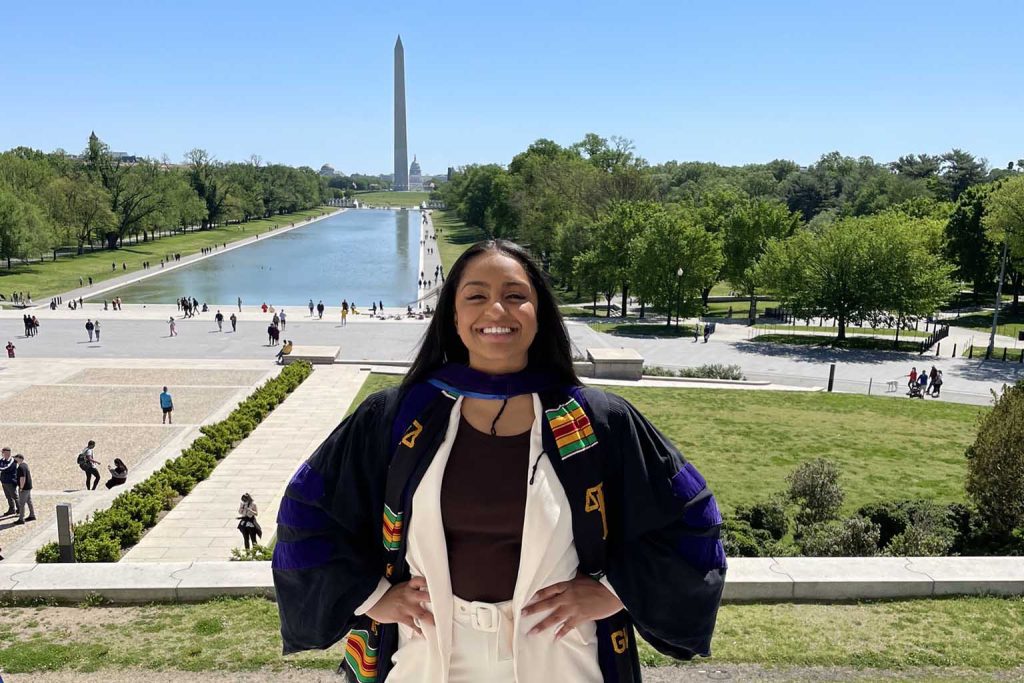Political Science Major
Back to Majors, Minors & Academic Programs
About the Major
Political science studies the structure, operation, and policies of governments; compares governmental and economic systems across countries; examines relationships between states, international organizations, and nongovernmental actors; and engages with theoretical perspectives that shape the study and practice of politics. The profession seeks to understand how power operates within and between political communities and how these communities manage cooperation and conflict— through political parties, elections, interest group advocacy, international organizations, and public opinion outlets — and make collective decisions for the public good.
Jobs in Political Science
- Legal professions
- Local, state and federal government
- Nonprofit and think tanks
- Pollster and political strategist
- Consultant/policy analyst
- Foreign/diplomacy
Past Elon Political Science Internships
- The White House
- U.S. Congress
- Federal agencies
- International NGOs
- Think tanks
- Small and large law firms
- State and local governments
Related Majors
From the Iowa caucuses to a presidential inauguration, her political science degree was built on hands-on learning

Morgan Bodenarain’s passion for politics began at a young age — she was just a preteen in middle school when she campaigned for Barack Obama in 2008, knocking on doors and making phone calls for the Democratic presidential nominee.
So you can imagine her thrill — just two presidential election cycles later — when she was given the chance to spend Elon’s winter term in Iowa for the 2016 caucuses.
The political science and policy double major still talks about the “once-in-a-lifetime experience” with former classmates in Washington, D.C., where she now works as a policy director and counsel for the Congressional Black Caucus.
When Elon says experiential learning is one of the things they want to ensure that every student gets to dip their toes into at the school, they mean it and they provide ample opportunity to do so.
“It was an incredible experience, being able to be on the ground in cold Iowa, making phone calls, seeing (everything) firsthand,” said Bodenarain, who was able to meet the slate of candidates, including Bernie Sanders, for whom she was campaigning. “There’s a lot happening in Iowa, and it was a really unforgettable experience for all the students who were there.”
Then, prior to learning the results of the 2016 election, she and her classmates had the opportunity to sign up to visit D.C. in January for the inauguration — Elon’s way of showing its political science students a presidential campaign from start to finish. That winter term had them going all around the district meeting leaders in federal government and on Capitol Hill.
That kind of opportunity is just one of the ways Elon puts into practice its promise of experiential learning, said Bodenarain, who graduated Elon in 2018.
“When Elon says experiential learning is one of the things they want to ensure that every student gets to dip their toes into at the school they mean it, and they provide ample opportunity to do so,” she said. “Not that I am saying that working and taking tests and doing the typical studying and work isn’t valuable, but I have always found that those experiences that are outside the four walls of the classroom are so helpful and are a much better way for me to learn and gain knowledge and experience.”
Bodenarain was active in student government in high school and carried that involvement into undergrad and law school; among her many leadership roles were student body president at Elon and president of the Black Law Students Association at George Washington University School of Law.
Elon, she said, prepared her well for those roles as well as for her jobs working in politics and policy. She recalls simulation classes where students would act out such events as the Constitutional Convention and the French Revolution and learn first-hand what it’s like to be in a political minefield and how to manage different personalities.
“It helped with understanding the balancing of interests, of ensuring you’re serving the people, your constituents, even if it may not align with your own ideology at the time,” Bodenarain said.
Today, Bodenarain works for the Congressional Black Caucus where she assists in building the caucus’s political agenda and supports all 60 congressional members of the caucus in accomplishing their policy priorities.
She’s spent a lot of time in Washington since her graduation from Elon — first at law school and through its fellowships and clerkships, then as a legislative assistant for U.S. Rep. G. K. Butterfield followed by a job as a legal adviser at the Federal Communications Commission — and she credits Elon with educating her on the district’s nuances, not only through the trips to Iowa and D.C. but in the research she was able to dedicate an entire semester to for her capstone project on congressional gridlock.
“The experiences outside the classroom were really helpful in setting me up to be knowledgeable for how things in D.C. work generally,” she said. “I think politics in D.C. is different from politics in other places and having those experiences with the presidential race and going to D.C. afterward, and just in general, I was pretty well prepared for what it was going to look like when I got here.”
Did You Know?
- Students first explore fundamental concepts of political science, then focus their studies in one or more subfields: American government, international relations, comparative politics, and political theory.
- Students don’t just study political thought and practice; they participate in it. Elon’s approach combines coursework, research projects, role-playing simulations, community-based learning projects, study abroad opportunities, seminars and internships, and polling through participation in the Elon University Poll.
- For the classes of 2018, 2019 and 2020 combined, 95% of political science majors at Elon were either employed or enrolled in a graduate or professional program nine months after graduation.

